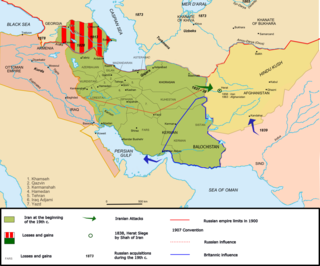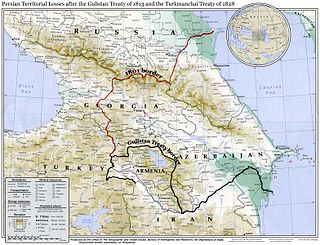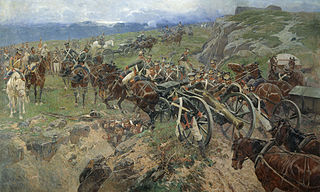
The Great Game was a set of political, diplomatic and military confrontations that occurred through most of the 19th century and the beginning of the 20th century—involving the rivalry of the British Empire and the Russian Empire over Afghanistan and neighbouring territories in Central and South Asia, such as Turkestan, and having direct consequences in Persia, British India, and Tibet.

The Anglo-Russian Convention of 1907, or Convention between the United Kingdom and Russia relating to Persia, Afghanistan, and Tibet, was signed on August 31, 1907, in Saint Petersburg. It ended the longstanding rivalry in Central Asia and enabled the two countries to outflank the Germans, who were threatening to connect Berlin to Baghdad with a new railroad that could potentially align the Ottoman Empire with Imperial Germany.

The Treaty of Gulistan was a peace treaty concluded between the Russian Empire and Iran on 24 October 1813 in the village of Gulistan as a result of the first full-scale Russo-Persian War. The peace negotiations were precipitated by the successful storming of Lankaran by General Pyotr Kotlyarevsky on 1 January 1813. It was the first of the series of treaties signed between Qajar Iran and Imperial Russia that forced Persia to cede the territories that formerly were part of Iran.

The Treaty of Finckenstein, often spelled Finkenstein, was a treaty concluded between France and Persia (Iran) in the Finckenstein Palace on 4 May 1807 and formalised the Franco-Persian alliance.

The Battle of Krtsanisi was fought between the Qajar Iran (Persia) and the Georgian armies of the Kingdom of Kartli-Kakheti and Kingdom of Imereti at the place of Krtsanisi near Tbilisi, Georgia, from September 8 to September 11, 1795, as part of Agha Mohammad Khan Qajar's war in response to King Heraclius II of Georgia’s alliance with the Russian Empire. The battle resulted in the decisive defeat of the Georgians, capture, and complete destruction of their capital Tbilisi, as well as the temporary absorption of eastern parts of Georgia into the Iranian Empire.

The Treaty of Turkmenchay was an agreement between Qajar Iran and the Russian Empire, which concluded the Russo-Persian War (1826–1828). It was second of the series of treaties signed between Qajar Iran and Imperial Russia that forced Persia to cede or recognize Russian influence over the territories that formerly were part of Iran.

Pierre Amédée Emilien Probe Jaubert was a French diplomat, academic, orientalist, translator, politician, and traveler. He was Napoleon's "favourite orientalist adviser and dragoman".
The Russo-Persian Wars or Russo-Iranian Wars were a series of conflicts between 1651 and 1828, concerning Persia (Iran) and the Russian Empire. Russia and Persia fought these wars over disputed governance of territories and countries in the Caucasus. The main territories disputed were Aran, Georgia and Armenia, as well as much of Dagestan – generally referred to as Transcaucasia – and considered part of the Safavid Iran prior to the Russo-Persian Wars. Over the course of the five Russo-Persian Wars, the governance of these regions transferred between the two empires. Between the Second and Third Russo-Persian Wars, there was an interbellum period in which a number of treaties were drawn up between the Russian and the Persian Empires, as well as between both parties and the Ottoman Empire. Ottoman interest in these territories further complicated the wars, with both sides forming alliances with the Ottoman Empire at different points throughout the wars. Following the Treaty of Turkmenchay, which concluded the Fifth Russo-Persian War, Persia ceded much of its Transcaucasian territory to the Russian Empire.

Relations between the Grand Duchy of Moscow and the Persian Empire (Iran) officially commenced in 1521, with the Safavids in power. Past and present contact between Russia and Iran have long been complicatedly multi-faceted; often wavering between collaboration and rivalry. The two nations have a long history of geographic, economic, and socio-political interaction. Mutual relations have often been turbulent, and dormant at other times.

The 1804–1813 Russo-Persian War was one of the many wars between the Persian Empire and Imperial Russia, and began like many of their wars as a territorial dispute. The new Persian king, Fath Ali Shah Qajar, wanted to consolidate the northernmost reaches of his kingdom—modern-day Georgia—which had been annexed by Tsar Paul I several years after the Russo-Persian War of 1796. Like his Persian counterpart, the Tsar Alexander I was also new to the throne and equally determined to control the disputed territories.

Iran–United Kingdom relations are the bilateral relations between the United Kingdom and Iran. Iran, which was called Persia by the West before 1935, has had political relations with England since the late Ilkhanate period when King Edward I of England sent Geoffrey of Langley to the Ilkhanid court to seek an alliance.

French–Iranian relations are the international relations between France and Iran. Iran has generally enjoyed a friendly relationship with France since the Middle Ages. The travels of Jean-Baptiste Tavernier are particularly well known to Safavid Persia. France has an embassy in Tehran and Iran has an embassy in Paris.

The Persian Gulf Residency was an official colonial subdivision of the British Raj from 1763 until 1947, whereby the United Kingdom maintained varying degrees of political and economic control over several states in the Persian Gulf, including what is today known as the United Arab Emirates and at various times southern portions of Persia, Bahrain, Kuwait, Oman, and Qatar.

A Franco-Persian alliance or Franco-Iranian alliance was formed for a short period between the French Empire of Napoleon I and Fath Ali Shah of Qajar Persia against Russia and Great Britain between 1807 and 1809. The alliance was part of a plan to gather extra aid against Russia and by Persia's help, having another front on Russia's southern borders, namely the Caucasus region. The alliance unravelled when France finally allied with Russia and turned its focus to European campaigns.

Various Franco-Indian Alliances were formed between France and various Indian kingdoms from the 18th century to the ascent of Napoleon. Following the alliances of Dupleix, a formal alliance was formed between by King Louis XVI during the American Revolutionary War in an attempt to oust the British East India Company from the Indian subcontinent. Later, numerous proposals of alliance were made by Tipu Sultan, leading to the dispatch of a French fleet of volunteers to help him, and even motivating an effort by Napoleon to make a junction with the Kingdom of Mysore through his 1798 campaign in Egypt.

Askar Khan Afshar was a Persia ambassador who was sent to Paris, during the period of the Franco-Persian alliance. He arrived in Paris on 20 July 1808 and met Napoleon on 4 September 1808 at Château de Saint-Cloud. He left in April 1810, as Persia in turn allied with Great Britain, then France's enemy in the Napoleonic Wars.

France–Asia relations span a period of more than two millennia, starting in the 6th century BCE with the establishment of Marseille by Greeks from Asia Minor, and continuing in the 3rd century BCE with Gaulish invasions of Asia Minor to form the kingdom of Galatia, and Frankish Crusaders forming the Crusader states. Since these early interactions, France has had a rich history of contacts with the Asian continent.
The D'Arcy Concession was a petroleum oil concession that was signed in 1901 between William Knox D'Arcy and Mozzafar al-Din, Shah of Persia. The oil concession gave D'Arcy the exclusive rights to prospect for oil in Persia. During this exploration for oil, D'Arcy and his team encountered financial troubles and struggled to find sellable amounts of oil. Facing high costs, they were about to give up but eventually struck large commercial quantities of oil in 1908. The Burmah Oil Company created the Anglo-Persian Oil Company to take over the concession in 1909.
The foreign alliances of France have a long and complex history spanning more than a millennium. One traditional characteristic of the French diplomacy of alliances has been the "Alliance de revers", aiming at allying with countries situated on the opposite side or "in the back" of an adversary, in order to open a second front encircling the adversary and thus re-establish a balance of power. Another has been the alliance with local populations, against other European colonial powers.

Qajar Iran, also referred to as Qajar Persia, the Qajar Empire, Sublime State of Persia, officially the Sublime State of Iran and also known as the Guarded Domains of Iran, was an Iranian state ruled by the Qajar dynasty, which was of Turkic origin, specifically from the Qajar tribe, from 1789 to 1925. The Qajar family took full control of Iran in 1794, deposing Lotf 'Ali Khan, the last Shah of the Zand dynasty, and re-asserted Iranian sovereignty over large parts of the Caucasus. In 1796, Agha Mohammad Khan Qajar seized Mashhad with ease, putting an end to the Afsharid dynasty. He was formally crowned as Shah after his punitive campaign against Iran's Georgian subjects.















